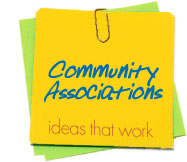The Evolving Partnership Between Community Association Boards and the Professional Manager
Recently there has been much discussion about what the role of the professional community association manager should be. For many years the manager has often been expected (by the client and Man-agement Company) to be an expert in all areas of physical property maintenance and management as well as all administrative areas including accounting, law, corporate administration, personnel and soci-ology. Many would say this is simply too big a slice of the pie for most people to handle.
The above mixture of disciplines requires a knowledge base and skill level that is simply beyond the majority of people. To be an expert at any one of them can require a lifetime’s worth of experience and training. However, each day thousands of association managers find themselves called on to make decisions, recommendations and judgments in areas where their expertise is limited. Many times they get lucky and are right. But when they make a mistake both the manager and the association are forced to live with that mistake for a long time. It impacts the quality of service the association receives as well the manager’s credibility.

Guidance Every Step of the Way
Several years ago I had a conversation with J. P. Daem, one of the early pioneers in the management of community associations. He was telling me that the Boards of the communities he managed could only meet twice per year according to his contract. One of those meetings was the requisite Annual Meeting; the other was a meeting to empower him, as the managing agent, to take all actions necessary to manage the property. In other words, the operation of the community was to be entirely in the hands of the professional. The Board simply endorsed all policies and actions of the managing agent. If he needed to confer with the Board, he did so by placing a phone call or writing a letter to the President.
His point was this. He was a trained professional in association operation and management. He had spent years learning the refinements and subtleties of his craft. If some maintenance or administrative task was outside his area of expertise he could consult with an expert to determine the proper course of action. The volunteer Board members serving the various communities he managed had neither experience nor training in any of the areas listed above. Yet they had been put in the impossible position of running multi-million dollar non-profit corporations. Without any basis or background they were supposed to make decisions on everything from landscape maintenance and cable television installation to investing the reserve funds. Shouldn’t they have been relieved to turn over these tasks to someone trained to carry them out?
I can’t say whether they were or not. I lost track of J. P. a few years ago. Perhaps he is still quite successful employing his methodology. It certainly contains elements of compelling logic. J.P. believed in the manager as a “generalist” as well as an “association business executive”.
A “business executive” might be defined as a manager whose primary function is informational. That is, they would not be expected to be experts in all areas of maintenance, construction and sociology. They would gather information required for a particular decision of the Board, (often involving the use of outside professionals and consultants at the association’s expense) and make recommendations based on the advice of experts.
A “generalist”, on the other hand, might be expected to be expert in the above areas and be required to draft specifications and supervise routine as well as special maintenance and construction projects, interpret CC&Rs, handle insurance claims, etc. This would undoubtedly be less expensive for the Board in the short term, but may not be practical or cost effective over the longer term for a variety of reasons discussed below

Accounting
The Board of a community association is charged with the protection and enhancement of the value of the asset. To that end they are empowered by statute and their governing documents with broad authority. This authority includes areas of policy making, budgeting and maintenance. In some cases, theoretically, their authority cannot be delegated. However the responsibilities for making determinations in these areas can. Conflict between manager and Board most often occurs in these areas of maintenance and “quality of life” policy issues.
There is more to the value of the asset than the maintenance of the bricks and sticks. Quality of life issues arise that often cannot be easily quantified. The basis for decisions regarding the quality of life rest solely with the membership of the community. For example only the membership can say, through representative processes, whether the pool should be open at 6:00 am or 9:00 am, whether pets should be allowed in the community, or if the summer cookout should be funded.
It may be possible for a manager to maintain the physical plant of the community without input from the Board or members (especially with the advice and help of other professionals and consultants). Not prudent perhaps, but possible. Apartment managers do this routinely. So do commercial property managers. That is their training. It is not as easy for a manager to determine the best rules and regulations or “quality of life” policies for a community.
A PCAM, (Professional Community Association Manager), is trained to understand the best methods of maintenance, communications, problem solving, administrative structure and financial operations of a community. They are trained in methods and processes. They are trained to assist the Board in determining viable solutions to problems. They have been trained to assist the Board in implementing effective methods of communication and they tell the Board how to communicate using those methods. What needs to be communicated can differ from one community to the next depending on the priorities of the community members and the Board. Experience and education may allow a PCAM special insight into these areas. They are experts at using other experts to determine how best to solve a specific problem or accomplish a specific task. This is especially true in nonelective areas of operation such as budgeting, maintenance and reserves. In elective areas, they can say “how”, but who says “what”? In the case of J. P., if I understood him correctly, he said both “what” and “how”. A balance did not exist.
At the other extreme is a Treasurer I know who believes the job of the Board is to supervise, scrutinize and micromanage the day-to-day activities of the management firm and all vendors working on the property. In this case the Board says “what” and “how”, then proceeds to manage the manager in every task undertaken. Here too, the balance is nonexistent. It is the classic community association problem. Where should the Board’s involvement end and the manager’s authority begin?
In municipal governments, which employ a manager, all day-to-day tasks are the responsibility of the manager. The council meets only to decide questions of policy and pass ordinances. Once a decision is made, it becomes the task of the manager to determine the best methods of implementation. If research is required before an ordinance or policy can be decided it is often the manager who does the research for the council by contacting outside professionals and consultants. The manager is not expected to be an expert in all areas. He is expected to gather information from experts and present their findings and recommendations to the Board. The suggestion that managers and associations begin relying on the expertise of consultants and outside professionals may cause some Boards to chafe because of the addi-tional costs. Some managers may object because they feel it denigrates their position or some how diminishes their value to their clients. I would disagree in both cases.

Perfect Harmony
A Question of Balance
In 30 years I have yet to meet a manager whose qualifications included being a CPA, engineer, licensed investment broker, attorney, licensed insurance agent and licensed contractor all at one time. A manag-er may have indepth knowledge of one or two of these areas and a superficial knowledge in many others. But they would be hard pressed to say they were qualified experts in all these areas. And yet, the Board often expects the manager to have expertise in all these areas.
Hocus Pocus, Where’s the Focus?
How did this situation come about? How and why is it perpetuated? The answers can vary but generally they can be summed up in three words… money, money and money. Many association Boards feel their primary responsibility is to keep assessments as low as possible. They often take the lowest bid for a job (including management) and then feel the need to micro-manage each job to make certain it is “done correctly”. Often, “done correctly” can mean performance to a standard which has not been sufficiently defined or paid for. Management companies have contributed to this mentality by continually selling their services on a “We can save you more than they can” basis. The Board comes to expect the management entity to be self-contained with virtually no professional limitations, and to rarely require the association to use and pay for “outside” professional guidance. It is a rare manager who has never (innocently) given a legal opinion by interpreting the CC&Rs, or drafted an insurance specification without proper training, or supervised a roofing project while never passing a contractor’s examination, or… you get the picture. Managers do these things in an effort to please the client by saving them money.
Many managers are expected to draft specifications for everything from painting and roofing to asphalt and pool repair. The idea of hiring an outside professional (specialist) to create specifications for projects is often viewed by the Board as an alien and an unnecessary expense. “That’s what we hire a manager for.”, becomes the standard response to this suggestion. The manager then finds himself in the position of needing to cajole or plead with a vendor to acquire enough knowledge about a given discipline to draft a reasonably passable specification. Often, due to the manager’s limited time and knowledge, the specification will contain only minimum requirements and may leave out important elements that a professional or consultant in that field would have been able to foresee.
This is not an indictment of managers. Most managers work long hours and perform yeoman service for their clients. However, it may not be practical or even possible for them to be a “jack of all trades”. Nor is it likely that this is the most efficient, productive or cost effective way for the Board to spend its money. There must be another way, and there is.

A Juggling Act
Accepting Professional Limitations
Suppose for a moment that professional community association management is the same as any other executive profession. The manager’s job then becomes facilitation and information gathering so the Board can make informed decisions about jobs, contractors and administrative matters affecting their property and pocketbooks. One of the great advantages of having a manager should be the time they have for information gathering and their ability to communicate that information effectively to the Board.
Let us further suppose we serve on a Board. Our manager is the executive described above. We need to repair some potholes in the asphalt parking lot.
Under the traditional scenario the manager would draft a repair specification and put the job out for bid. Or perhaps the manager wouldn’t even attempt a specification but simply call three contractors and ask them to recommend a solution and submit a bid based on their recommendations (this is the more likely case). The Board might find themselves comparing apples to oranges or selecting from bids based on the contractor’s needs rather than their own.
It is probably a wiser course to have the manager contact a company specializing in asphalt engineering or repair and hire them at the association’s expense to draft a specification for the work, then have them request bids based on the specification. Have them evaluate the bids and make a recommendation on which contractor and seems best for the job. The entire transaction could occur between the consultant and the manager. The manager would then take the professional’s recommendation to the Board for action. Efficient, professional and yes, more costly than using the limited experience and training of the manager alone. However, the Board will have used prudent business judgment in making an informed decision.
The consultant can even be hired to supervise the work. He would report to the manager who would then report to the Board. An effective measure of the manager then becomes not simply what he knows, but what resources are available to him so he is not forced to exceed his professional limitations. What professional resources and contacts does the manager bring to the table? How effective are the manager’s communications in helping the Board to understand the recommendations of these qualified expert resources? In other words, how well does the manager manage? Not, how well does the manager draft maintenance or other specifications (a job for which he may or may not be qualified).
Use Professional Resources
Every Board might want to sit down with their attorney, insurance professional, landscape contractor, CPA, financial advisor, etc. once or twice a year to help them better understand the services required from, and those provided by, each. This annual review should also include the management contract. Each year the manager and Board could review the management agreement with an eye toward strengthening their professional relationship and the efficiency of the operations.
This “annual review” would be an opportunity for the Board to point out areas of strengths and weakness for the management team as well as providing an opportunity for the management firm to re-affirm the limits of management responsibilities. They might also want to use this opportunity to solicit help from the Board in controlling such things as non-emergency calls after hours or upgrading services through contractual amendment. The balance works when the manager is given the full trust and confidence of the governing body to recommend and then carry out policies.
The key phrase here is, “…full trust and confidence…” However, confidence must be earned. Many community association Board members will say, “We would love to not be involved in the day to day operations but we don’t feel we can have that trust and confidence in our manager.”
Why not? The answer is simple. At some point during the year it is likely that the manager somehow exceeded her professional limitations by undertaking a job for which she was not qualified, (and which she probably wasn’t responsible for contractually). The Board may have even directed her to do so in effort to save money by not using an outside expert. As a result, mistakes were probably made that the Board members interpreted as management failures. Or it may have been something as simple as a clerical error. Maybe a locksmith’s work was inadvertently charged to the landscape account. Or maybe a car was towed improperly. Maybe the painters did a miserable job painting the doors and Board members discovered it before the manager. It wouldn’t matter that the bill had not been paid or that the manager may have been planning to take corrective action. Maybe all these things happened this year.
Or the reverse the scenario may have occurred. Suppose the Board is weak. Maybe the President is a bully. Maybe the President is weak. Maybe conflict between Board members undermines confidence and fails to allow for clear direction to the manager.
In each instance a strong case could be made for the balance of authority to shift. It is a question of expectations. Clearly the Board members do a disservice to the manager and the community by involving themselves in areas where they have little or no expertise. By the same token, managers who exceed their professional and contractual limitations do the same disservice by creating unrealistic expectations in the minds of the Board. In all cases it is probably better for the Board to say what needs to be done and for the manager to say how these things can best be accomplished. Once decided the Board would be well served by taking the advice of their experts and professionals regarding maintenance and repairs and also trusting the manager to carry out the policies established by the Board.
In saying this let me caution that both the manager and the Board will occasionally make mistakes. This does not necessarily make them incompetent. It makes them human. I have often heard Boards say they cannot trust the manager’s performance because of mistakes made over the years. I have also heard managers accuse Boards of being incompetent because they make decisions against the manager’s advice.
What I am about to suggest may sound radical to some. All of us, managers, Board members and homeowners, must learn to be more “generous of spirit” if we are to help each other attain the highest levels of success. Occasional mistakes will occur. Bad decisions will be made. Few will be catastrophic and all can be corrected over time. We must remind each other and ourselves that we are not making “fate of nations” decisions. We are simply attempting maintain, protect and enhance the value of the property and the quality of life of the members.
Summary
Board members and managers work in a fishbowl. Their every action and decision is open to scrutiny and the second guessing of outsiders and each other. Mutual support is their greatest strength. Self-righteous indignation is their greatest weakness. The only certainties are their occasional fallibility’s as human beings and the controlled chaos of representative democracy.
Therefore, it is not so much a question of the balance of power/authority but the realization and acceptance that both the manger and the Board have a uniquely specialized role to play. Each must have concern for, and be supportive of, the other’s successes and shortcomings. Each must strive to improve with the knowledge and wisdom of experience. Each must agree that competence should rightfully be measured by the level of prudence and care demonstrated by all involved.
Managers, (and professional consultants to self-managed associations), must exhibit extreme professionalism, care and concern for the problems of the clients. Board members must exhibit this same professionalism, care and concern in their actions and demeanor relating to association members and managers. Each of the parties must appreciate the other’s knowledge and expertise and manifest this in mutual respect and trust, in successes and failures alike.
Success is built on mutual trust, understanding, knowledge and clearly defined expectations and areas of authority. The manager and the Board would do well to treat each other as partners in the operation of the community.
The nature of the Board/manager relationship has evolved over time. We must be able to recruit qualified personnel to serve in both capacities. To do this we must begin to view the relationship in its truest light.
The Board, (a group of volunteers often untrained), hires a professional with resources, skills and time it may lack. It solicits professional advice and, trusting it is credible, takes the appropriate actions. A manager must learn to give credibility to the opinions and desires of the Board, sometimes subordinating his personal opinions and preferences. The manager needs to help make the knowledge of other association professionals and consultants available to the Board so the Board can have a complete understanding of the problems and opportunities they face and the Board should be willing to pay for the knowledge and information it receives for these experts. The manager can be the Board’s gateway to every professional resource they will need to do a thoroughly competent and professional job running their multi-million dollar corporation.
Reposted from http://www.communityassociationmanagement.com/governance/management-companies/2362-a-question-of-balance.html
0.000000
0.000000













